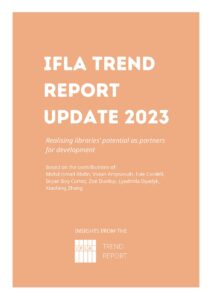Influencing impact: IFLA Trend Report Update 2023 explores what shapes libraries’ ability to shape development
26 March 2024
 The 2023 edition of the IFLA Trend Report highlights both potential blockers to libraries’ impact on sustainable development, why it matters to find solutions, and what we can practically do to overcome them!
The 2023 edition of the IFLA Trend Report highlights both potential blockers to libraries’ impact on sustainable development, why it matters to find solutions, and what we can practically do to overcome them!
IFLA’s first Trend Report in 2013 offered a new and powerful tool for libraries and library and information workers to think about the future, and how to secure their place – and positive contribution – in this.
Since then, updates have provided an opportunity to stand back to look forwards, identifying long-term trends and tendencies that are shaping our field and profession.
Our latest edition follows in this overall pattern. It also, like our previous two reports, is based on the contributions of emerging leaders who, after all, are the ones who will not only face the consequences of trends, but also will be leading the response.
Shaping the shapers
The key theme of this edition, which brings together the insights shared by leader at our 2023 World Library and Information Congress, is what affects libraries’ ability to contribute to the achievement of sustainable development.
This is an active question for our field. We know that we have a very strong scope to help more people access the knowledge, develop the skills, and build the connections they need to realise their rights and potential. The starting point for the report is that we are not yet achieving all that we could, and to think about why that might be.
The Report therefore sets out twelve suggested trends that could be holding us back. These range from ways in which libraries are perceived, the way we value information and knowledge in general, and broader social, economic, political and environmental trends.
Crucially, while the trends themselves are challenges, under each, there are proposals for how we can overcome barriers, and become ever more powerful as partners for development.
12 Trends
- Libraries are increasingly seen as irrelevant in a changing world
- The world is going down a path that discounts the value of community-driven infrastructures, and of information for development
- In many countries, public spending – and so scope for investment – is tightening
- More diverse societies make delivering universal services and achieving equity more complicated
- Regulation of digital spaces is accelerating, but without consideration of impacts on how libraries support development
- An increasingly uncertain world intensifies challenges and complicates service-delivery
- There are persistent and growing barriers to building partnerships for development
- Persistent geographical inequalities are reinforced by unequal investment in public services
- Library and information workers are seen as auxiliaries, rather than development actors in their own right
- Globalisation continues, opening up new expectations for information access
- Even as connectivity improves, the digital divide is persistent and getting more serious
- We are too busy dealing with crises to think strategically
Take a look at the whole report on our Repository, and we are very grateful to Mohd Ismail Abdin, Vivian Amponsah, Evie Cordell, Bryan Boy Cortez, Zoë Dunlop, Lyudmila Dyadyk, and Xiaofang Zhang for their work!
Download
IFLA Trend Report Update 2023
The 2023 Update in our Trend Report series focuses on trends that affect libraries' ability to support sustainable development. It ranges from issues within our own field to much wider political, economic, social and environmental trends, and was made possible through the contributions of the emergi...
Looking ahead
This is the first of two Trend Reports to be published this year. Work is already well underway in preparing for the 2024 edition, which will be launched at the IFLA Information Futures Summit in Brisbane, Australia on 30 September – 3 October 2024.
You can read more about the scope of the 2024 Report, as well as about the Summit more broadly, on the website.